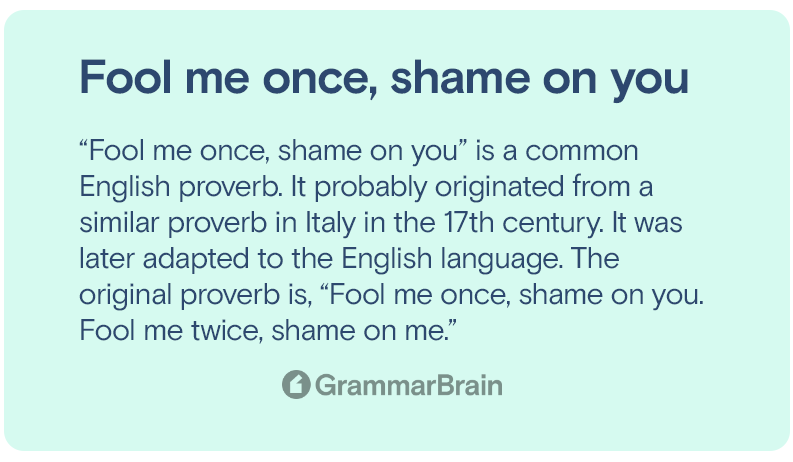Fool me once, shame on you. What does this mean? This is a common idiom that is spoken frequently in the English language. It refers to the idea of being fooled or tricked multiple times. And the person who is to blame.
What does “Fool me once, shame on you” mean?
You were talking to your friend, and they said, “Fool me once, shame on you.” You are now wondering what they meant.
Don’t worry, you won’t have to go through grammar books to find out. We’ll tell you exactly what the proverb means and how to use it in conversations.

Origin of the idiom
“Fool me once, shame on you” is a common English proverb. It probably originated from a similar proverb in Italy in the 17th century. It was later adapted to the English language. The original proverb is, “Fool me once, shame on you. Fool me twice, shame on me.”
Like many other proverbs this has been altered by use. It has been contracted to the form “Fool me once, shame on you”. It has also been further reduced to simply “Fool me once.”
Meaning of the idiom
When you say “Fool me once, shame on you” it means that you have learned from previous mistakes. The implication is that you have encountered a situation before, and you handled it incorrectly at the time. But you have grown wiser because of that experience.
So you won’t repeat the same mistake again. It also indicates that the first time someone manages to fool you, it is shameful for them as you were innocent. But if they manage to fool you, in the same way, a second time, then it is your fault for not having learned the lesson the first time.
Use in conversation
You can use the phrase in conversation to mean that you have learned from a mistake or that someone should be ashamed for trying to do the same wrong thing twice. Let’s look at the following examples for some clarification.
“Do you expect me to give you a loan after you failed to repay me the last time? Fool me once, shame on you.”
“Of course I did not wait for you to buy the kids’ presents this year after you failed last time. Fool me once, shame on you.”
“Why do you want to go back to work at your last job? They will never give you the raise they promised. Fool me once, shame on you.”
Use of alternate forms
You could also use any of the forms of “Fool me once, shame on you” in any of the conversations mentioned before. Let us look at some examples.
In the first case, you can simply use the most contracted form. “Do you expect me to give you a loan after you failed to repay me the last time? Fool me once.” This lays stress on the fact that you will not be fooled again.
In the second case, you can use the expanded form. “Of course I did not wait for you to buy the kids’ presents this year after you failed last time. Fool me once, shame on you. Fool me twice, shame on me.” This lays stress on the fact that the other person should be ashamed of their mistake.
In the third case you can once again use the more contracted form. “Why do you want to return to work at your last job? They will never give you the raise they promised. Fool me once.” This would stress the fact that this person should learn from their previous mistake.
Inside this article
Fact checked:
Content is rigorously reviewed by a team of qualified and experienced fact checkers. Fact checkers review articles for factual accuracy, relevance, and timeliness. Learn more.
Core lessons
Glossary
- Abstract Noun
- Accusative Case
- Anecdote
- Antonym
- Active Sentence
- Adverb
- Adjective
- Allegory
- Alliteration
- Adjective Clause
- Adjective Phrase
- Ampersand
- Anastrophe
- Adverbial Clause
- Appositive Phrase
- Clause
- Compound Adjective
- Complex Sentence
- Compound Words
- Compound Predicate
- Common Noun
- Comparative Adjective
- Comparative and Superlative
- Compound Noun
- Compound Subject
- Compound Sentence
- Copular Verb
- Collective Noun
- Colloquialism
- Conciseness
- Consonance
- Conditional
- Concrete Noun
- Conjunction
- Conjugation
- Conditional Sentence
- Comma Splice
- Correlative Conjunction
- Coordinating Conjunction
- Coordinate Adjective
- Cumulative Adjective
- Dative Case
- Determiner
- Declarative Sentence
- Declarative Statement
- Direct Object Pronoun
- Direct Object
- Diction
- Diphthong
- Dangling Modifier
- Demonstrative Pronoun
- Demonstrative Adjective
- Direct Characterization
- Definite Article
- Doublespeak
- False Dilemma Fallacy
- Future Perfect Progressive
- Future Simple
- Future Perfect Continuous
- Future Perfect
- First Conditional
- Irregular Adjective
- Irregular Verb
- Imperative Sentence
- Indefinite Article
- Intransitive Verb
- Introductory Phrase
- Indefinite Pronoun
- Indirect Characterization
- Interrogative Sentence
- Intensive Pronoun
- Inanimate Object
- Indefinite Tense
- Infinitive Phrase
- Interjection
- Intensifier
- Infinitive
- Indicative Mood
- Participle
- Parallelism
- Prepositional Phrase
- Past Simple Tense
- Past Continuous Tense
- Past Perfect Tense
- Past Progressive Tense
- Present Simple Tense
- Present Perfect Tense
- Personal Pronoun
- Personification
- Persuasive Writing
- Parallel Structure
- Phrasal Verb
- Predicate Adjective
- Predicate Nominative
- Phonetic Language
- Plural Noun
- Punctuation
- Punctuation Marks
- Preposition
- Preposition of Place
- Parts of Speech
- Possessive Adjective
- Possessive Determiner
- Possessive Case
- Possessive Noun
- Proper Adjective
- Proper Noun
- Present Participle
- Prefix
- Predicate



